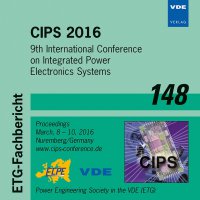Reliability of Lead-free Large Area Solder Joints in IGBT Modules with Respect to Passive and Active Thermal Cycling
Konferenz: CIPS 2016 - 9th International Conference on Integrated Power Electronics Systems
08.03.2016 - 10.03.2016 in Nürnberg, Deutschland
Tagungsband: CIPS 2016
Seiten: 6Sprache: EnglischTyp: PDF
Persönliche VDE-Mitglieder erhalten auf diesen Artikel 10% Rabatt
Autoren:
Beyer, H.; Sivasubramaniam, V.; Bayer, M.; Hartmann, S. (ABB Switzerland Ltd., Semiconductors, 5600 Lenzburg, Switzerland)
Inhalt:
Power semiconductor modules undergo extreme thermal excursions, which require reliable large area solder connections. Due to environmental regulations, suppliers of power electronic devices are enforced to replace commonly used lead containing solders by lead-free solders. In this work, the reliability of large area soldering connections between ceramic substrates and AlSiC baseplates prepared by the lead-free solders 95.5Sn3.8Ag0.7Cu (SAC387), 95Sn5Sb and the standard lead containing solder 62Sn36Pb2Ag is compared with respect to passive and active thermal cycling tests. In the passive thermal cycling tests, 62Sn36Pb2Ag and 95Sn5Sb exhibited a significantly higher reliability compared to SAC387. Otherwise, best reliability in active thermal cycling test was observed for SAC387. Here strong damages due to coarsening and void formation occurred on soldering connections prepared with 62Sn36Pb2Ag and 95Sn5Sb. The results are discussed with respect to mechanical properties of the investigated solders and calculated thermo-mechanical stress with respect to thermal cycling. 62Sn36Pb2Ag and Sn5Sb are recommended for soldering connections exposed to large thermo-mechanical stress, whereas the SAC solder should be used, if the CTE mismatch of the joining partners and the thermo-mechanical stress are comparably small, but for a longer cycling reliability.


